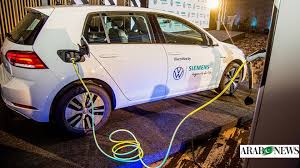By GHULAM ABBAS
ISLAMABAD: The Government of Pakistan has unveiled a forward-looking New Energy Vehicle (NEV) Policy for 2025-2030, aimed at revolutionizing the country’s transportation sector. Developed by the Engineering Development Board (EDB) under the Ministry of Industries and Production, this policy claims having a comprehensive framework for adopting sustainable, low-emission vehicles and fostering green technology across the nation.
As per documents available with this scribe, the policy addresses the urgent need to cut carbon emissions, as Pakistan’s transportation sector currently contributes nearly 30% of the country’s greenhouse gas output. It envisions a gradual transition to a zero-emission road fleet by 2060, with key milestones of 30% NEV sales by 2030, 90% by 2040, and 100% by 2050. This policy aligns with Pakistan’s Nationally Determined Contributions (NDCs) under the Paris Agreement, aiming to reduce emissions by 11.3 million metric tons of CO₂ within five years and 64.9 million metric tons by 2035.
As per official sources, EDB has started consultation with the stakeholders before finalizing the draft NEV policy. A meeting with stakeholders was held at the ministry of Industries here on Monday. According to insiders, the some of the existing players in the auto sectors are concerned that the new policy is being drafted to a new entrant in the EV market of the country where the sales of locally assembled vehicles have reduced drastically due to higher taxes, import restrictions multiple other reasons. The existing auto industry was also concerned that the inconsistency in government policies were also causing lack of investment in the sector. A long term and sustainable policy was needed to encourage investment in the EV sector where huge investment is needed on both manufacturing of vehicles and required transport infrastructure.
As per the draft NEV Policy, the new policy focuses on promoting the local NEV manufacturing industry, decreasing reliance on fossil fuel imports, and reducing carbon emissions. Major incentives are provided to boost NEV production, including tax breaks, reduced import duties on NEV components, and green financing options for companies investing in environmentally friendly technologies. To support these initiatives, the government will establish Special Technology Zones dedicated to NEV technology, allocating 20% of the space at reduced costs.
To accelerate NEV adoption, the policy emphasizes the creation of a widespread charging infrastructure across Pakistan. Charging stations will be installed in public areas and along major highways, with a requirement for Oil Marketing Companies to set up Level 3 charging stations at 10% of their locations. Private charging service providers will receive incentives, such as tax exemptions, reduced land costs, and simplified permit processes to facilitate easier installation and electricity access.
A key aspect of the NEV policy is its focus on environmental protection. It introduces safety and recycling standards for NEV batteries and components, promoting a circular economy. Financial incentives will encourage companies to invest in battery recycling, and recycling centers will be established nationwide. The government also aims to implement end-of-life policies for traditional fuel vehicles, incentivizing consumers to replace older models with NEVs.
The policy calls for a Center of Excellence in NEVs, which will focus on research, innovation, and workforce development to support the electric mobility sector. This initiative will include partnerships with academia and industry to foster technological advancements and equip the workforce with necessary skills for the NEV ecosystem.
Pakistan’s NEV Policy 2025-2030 establishes a strong foundation for a green transportation revolution, aligning with both national and international environmental objectives. The government’s vision, backed by incentives for businesses and consumers alike, is a promising step toward a sustainable future that reduces Pakistan’s carbon footprint while enhancing economic stability.
The key features and incentives introduced in Pakistan’s New Energy Vehicle (NEV) Policy 2025-2030 include a range of goals and support measures. The government has set targets to achieve a 100% zero-emission vehicle fleet by 2060, aiming to reduce dependence on imported fossil fuels and promote economic stability. To support the manufacturing and industry, NEV-specific technology zones will offer reduced-cost space, leasing options, and green loans. Financial benefits will include a 1% customs duty on NEV parts and 10% on complete NEV imports until 2027, along with sales tax exemptions for locally manufactured components. Heavy commercial vehicles will be incentivized with customs duty reductions until local production increases.
The policy also outlines a network plan for charging stations in cities, highways, and public spaces, including subsidies for Level 2 and Level 3 chargers. Private companies will receive income tax exemptions, subsidized electricity rates, and reduced land costs for a 10-year lease to install charging stations. For consumers, the policy provides toll and registration fee exemptions, and up to 25% rebates for fleet NEV adoption. Interest-free loans will be available to government employees and fleet operators, with targeted green loans for commercial and public transport.
Environmental safeguards are emphasized, with incentives for companies involved in battery recycling and end-of-life vehicle disposal. Consumers will be encouraged to trade in older vehicles with a 20% credit toward a new NEV. Additionally, the policy supports innovation and workforce development, with plans for a Center of Excellence to lead NEV research and training. Workforce programs will collaborate with educational institutions to provide skills in NEV technology.
Tax and financial relief includes green financing linked to performance targets, accelerated depreciation on large investments, and specialized tariffs to support local NEV manufacturing. The government under this policy, will adopt NEVs in public fleets and launch nationwide awareness campaigns to educate citizens on the benefits of sustainable transportation.
As per sources, if approved and implemented, the NEV would be second policy for electric vehicles, which was made part for the country’s existing auto policy 2021-2026. Through the new auto policy, incentives were introduced from EV parts imports. However the entrants in the EV market feel the incentives insufficient to attract required investment, thus forcing the government to incentivize the sector further.


